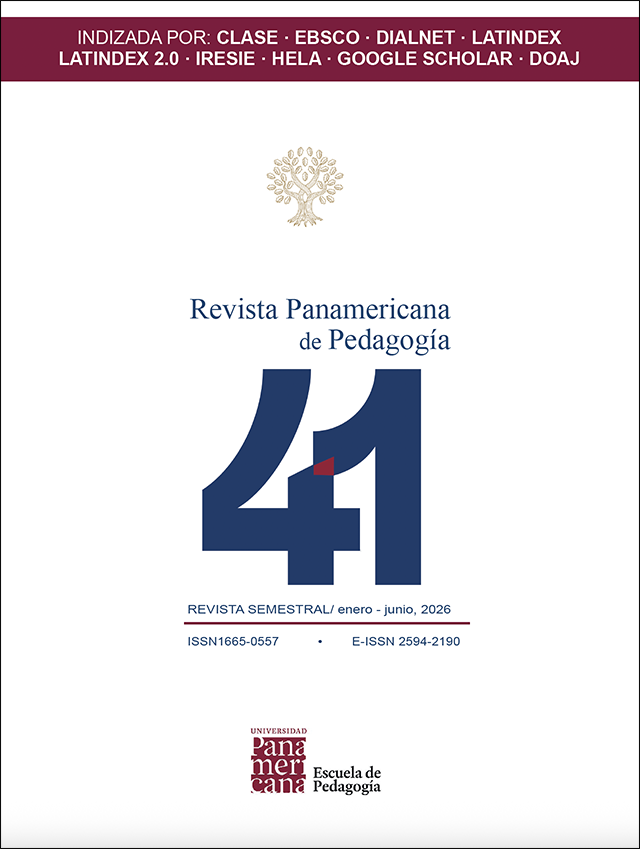Published 2025-08-29
Keywords
- Inclusion,
- Attitude,
- Teacher,
- Special educational need,
- ASD
Copyright (c) 2025 Revista Panamericana de Pedagogía

This work is licensed under a Creative Commons Attribution 4.0 International License.
How to Cite
Abstract
Introduction: The new inclusive school model of education must build a more equitable and fairer society which speaks to diversity from the point of perception and valuation of difference. Objectives: This research reveals the attitude of education professionals towards children with special educational needs and most of all those associated with ASD from a comparative consideration of the two educational systems, Spanish and Ecuadorian. Method: The semi-structured interview and the intensive questionnaire were employed with a final sample of cooperating subjects consisting of ten teachers, seven actually working in the Ecuadorian education system and three belonging to the Spanish education system. Conclusions: It was found that, on the whole, both positive and negative attitudes towards the inclusive teaching model were determined by a group of variables derived from preconceptions or prejudices.
References
- Albornoz, K., & Jurado, M. (2022). Actitud de los docentes de aula las actividades ejecutadas por psicopedagogo. Ciencia Latina Revista Científica Multidisciplinar, 6(6), 1705-1723. https://doi.org/10.37811/cl_rcm.v6i6.3623
- Castillo-Acobo, R. Y., Quispe-Berríos, H., Arias-Gonzáles, J. L., & Amaro-Guzmán, C. J. (2022). Consideraciones de los docentes sobre las barreras de la educación inclusiva. Revista de filosofía, 39(2), 587-596. https://doi.org/10.5281/zenodo.7315432
- De-Rondón, L. (2022). 19. Pedagogía Activa: Una teorética transdisciplinaria para la humanización de La enseñanza. Revista Científica CIENCIAEDUC, 9(1), 1-15. https://saber.unerg.edu.ve/index.php/cienciaeduc/article/view/271
- González-Rojas, Y., & Triana-Fierro, D. A. (2018). Actitudes de los docentes frente a la inclusión de estudiantes con necesidades educativas especiales. Educación y educadores, 21(2), 200-218. https://doi.org/10.5294/edu.2018.21.2.2
- Kielblock, S., & Woodcock, S. (2023). Who’s included and Who’s not? An analysis of instruments that measure teachers’ attitudes towards inclusive education. Teaching and Teacher Education, 122(15), 103-122.
- López-Marí, M., Vidal-Esteve, M. I., & Gómez, S. (2022). Tendencias actuales sobre estrategias para la inclusión educativa de alumnado con Trastorno del Espectro Autista (TEA). Inclusion and Society Journal, 2(1), 14-25. https://www.mlsjournals.com/MLS-Inclusion-Society/article/view/1318
- Martinez-Serrano, M. E. (2023). El derecho de los niños, niñas y adolescentes a una educación inclusiva de calidad: homogeneización vs diversificación. [Trabajo de fin de Máster, Universidad de Oviedo]. http://hdl.handle.net/10651/66449
- Polo-Márquez, E., Leiva-Olivencia, J. J., & Sandoval-Mena, M. (2023). Apoyo a la inclusión educativa del alumnado con Trastornos del Espectro Autista: un estudio preliminar de asistentes personales. Revista electrónica interuniversitaria de formación del profesorado, 26(1), 179-197. https://doi.org/10.6018/reifop.553511
- Rodríguez-Fuentes, A., Gallego-Ortega, J. L., Navarro-Rincón, A., & Caurcel-Cara, M. J. (2021). Perspectivas actitudinales de docentes en ejercicio y en formación hacia la educación inclusiva. Psicoperspectivas, 20(1), 18-30. https://doi.org/10.5027/psicoperspectivas-Vol20-Issue1-fulltext-1892
- Sandoval, C., Quispe, F., & Guillén, R. (2021). Comprensión de los cambios en la conceptualización del trastorno del espectro autista para la inclusión educativa. Persona, 24(2), 27-47. https://doi.org/10.26439/persona2021.n024(2).5562
- Sisto, M., Pérez-Fuentes, M. C., Gázquez-Linares, J. J., & Molero-Jurado, M. M. (2021). Actitudes hacia la inclusión educativa de alumnos con discapacidad: variables relativas al profesorado ya la organización escolar en Educación Primaria. Revista electrónica interuniversitaria de formación del profesorado, 24(1), 52-63. https://doi.org/10.6018/reifop.397841
- Solís-García, P., & Arroyo-Resino, D. (2022). Actitudes docentes hacia alumnos con discapacidad, punto de partida para la educación inclusiva: una perspectiva de género, edad y experiencia previa. Espiral. Cuadernos del profesorado, 15(30), 83-88. https://doi.org/10.25115/ecp.v15i30.4537
- Tabara-Sabalú, C. D. J., & García-Huamán, F. T. (2020). Actitud de los docentes frente a los estudiantes con necesidades educativas especiales, Amazonas, Perú, 2020. Revista Científica UNTRM: Ciencias Sociales y Humanidades, 3(2), 38-42. https://doi.org/10.25127/rcsh.20203.580
- Uzcátegui, A., Sánchez, Y., & Moreno, Y. (2022). Variables contextuales educativas de los Trastornos del Espectro Autista (TEA). Lineamientos para directivos. Mérida-Venezuela. 2020-2021. Conocimiento Libre y Licenciamiento (CLIC), (26). https://convite.cenditel.gob.ve/publicaciones/revistaclic/article/view/1153/152
- Zuloaga, J. T. (2022). Actitudes docentes frente al estudiantado con discapacidad: una revisión de literatura. Ciencia y Educación, 6(1), 83-94. https://doi.org/10.22206/cyed.2022.v6i1.pp83-94






